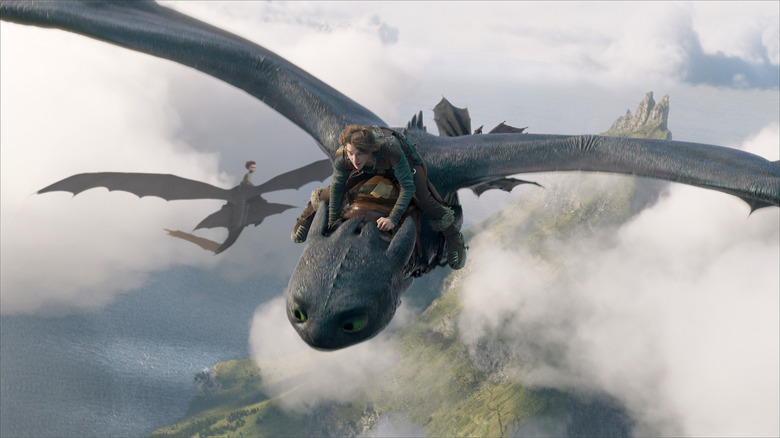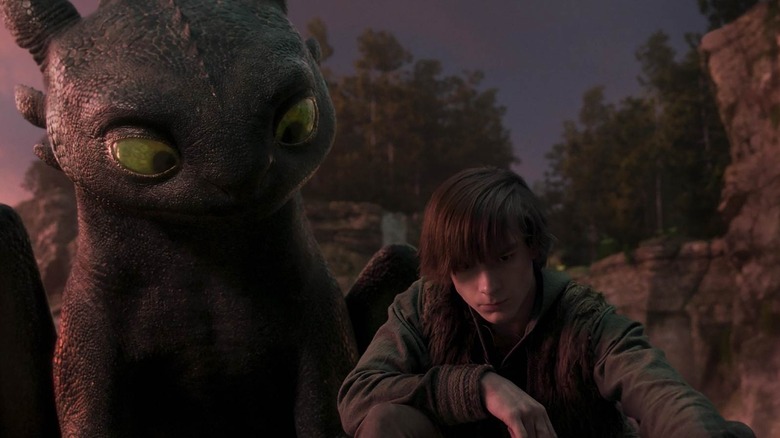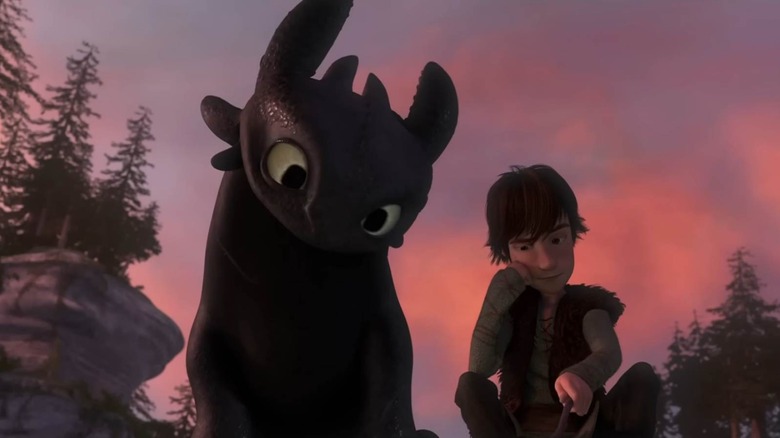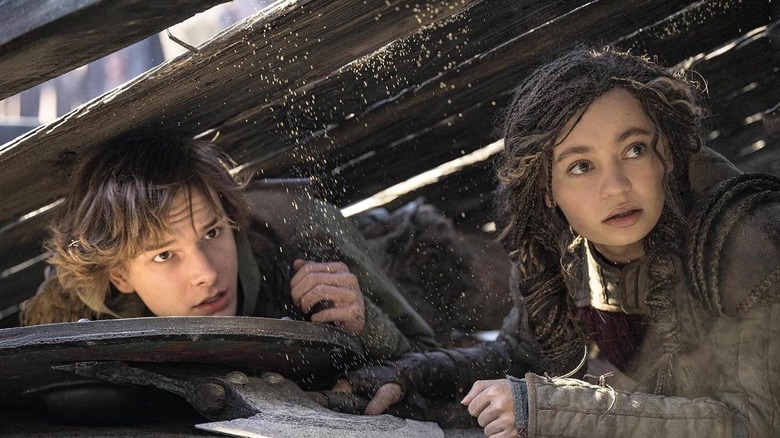Why The How To Train Your Dragon Remake Haters Are Completely Missing The Point
The "How to Train Your Dragon" live-action remake from director Dean DeBlois has finally taken flight this week, and with it comes the inevitable discourse of critics and audiences alike voicing their opinions. The common consensus is that, amid the current trend of adapting animated classics into live-action, Universal's new take on the beloved 2010 film could be the best of a bad lot, but that it still feels quite unnecessary. Aside from a few character deviations, Hiccup and Toothless' initial steps in this inevitable three-picture journey are nearly identical to those of the franchise it's expanding.
Let me preface this by saying that I love the original "How to Train Your Dragon" movies and believe them to be one of the greatest trilogies ever made. The heartfelt and exhilarating story of Hiccup's journey befriending and eventually parting ways with the legendary Night Fury will always hold a special place that few other films can compete with.
But just as Hiccup faces disbelief and outrage at the notion that dragons are simply misunderstood creatures, the routine rebuttals of this new iteration arise: that a shot-for-shot remake of another film is unnecessary and that creating a live-action version of an animated classic pushes the aforementioned medium closer to its end. I'm not necessarily argue against those points, but I question whether those stances are worth making anymore. By perpetuating the same arguments, we're doing nothing more than venting frustrations, rather than examining why these films are being made in the first place.
Haters need to stop remaking the same old argument
Retelling a story inevitably leads to change at some point. However, the extent of those changes is up to the storyteller. Locations may shift, and characters might take unexpected turns, but the core plot remains intact. With this in mind, how much is required to change for the retelling to be worthy of existing? Undoubtedly, not much differs from both versions of "How to Train Your Dragon," but hasn't DeBlois fulfilled his role by successfully retelling the original story? If your response to this is, "It didn't need to be remade in the first place," can't the same argument be applied to any other remake of what came before?
We can't scoff at the release of "How to Train Your Dragon" and then go wild over the first look at Guillermo del Toro's "Frankenstein," which will join over 100 adaptations that have approached Mary Shelley's classic story in one way or another. Other staples of literature and theatre might fall under the same umbrella, with everything from Sherlock Holmes to Shakespeare being adapted multiple times since the dawn of the moving image. In that case, should Franco Zeffirelli's "Romeo & Juliet," which remains faithful to the era in which the story is set, be criticized for playing it safe and marked down against Baz Luhrmann's pistol-packing adaptation? Perhaps, though, the argument with "How to Train Your Dragon" is less about the shot-for-shot replication, and more about the fact that it might hinder another art form fighting for survival.
We're all a little at fault for the decline in animation
The regular issue that "How to Train Your Dragon" and the slew of Disney remakes face is that every entry is perceived as another knock at animation, inadvertently diminishing the much-loved art form. However, the truth is that it's as much our own fault as it is the studio's.
There was a brief glimmer of hope that moviegoers were truly voting with their wallets after Disney's live-action "Snow White" bombed. This was soon followed by news from The Hollywood Reporter that plans for a live "Tangled" adaptation were being put on hold, presumably as a response to that misfire. But then "Lilo & Stitch" arrived, dominating the box-office and quickly earning a spot as one of the year's most successful films. This proved that audiences aren't necessarily growing tired of hearing the same story in a different form; they're just selective about which ones they want to hear.
This sad truth is that it's difficult to determine how original animated entries not linked to an existing IP can compete in a market comprised of safe, comfortable viewing. It's not for lack of trying; we are simply too far gone in our demand for what now feels like its own sub-genre. Live-action remakes are moneymakers just as much as sequels, prequels, or comic book movie-connected entries (which, it could be argued in some cases, are also remakes). The only perk is that the most recent addition has so much going for it that it can benefit more original works in the future.
How to Train Your Dragon is just undeniably good
The 2025 "How to Train Your Dragon" now has the franchise's lowest score on Rotten Tomatoes, albeit still a respectable 77%. While that may validate the naysayers, the projected box office for its opening certainly won't. According to reports, Toothless and friends are exceeding expectations, with the new film earning $84 million in its opening weekend (via Deadline). It's a success story that some may not want to acknowledge, but it is well-deserved by the dragon riders bringing the tale to life.
Whether you like it or not, Mason Thames and Nico Parker deliver commendable performances as Hiccup and Astrid and should receive more recognition because of it. These are the kinds of projects that can advance both stars further in the careers they deserve. By appearing in a major IP now, you can guarantee that you'll see them in original stories (which critics of these types of films complain about not seeing any more) later. The issue is that easy money-makers like this need to exist in between for that to happen.
Ultimately, relinquishing the argument against this cinematic trend isn't easy, and it's even more challenging because there's no sign of it or its imperfections going anywhere. "How to Train Your Dragon" is a remake in every sense of the word, and whether it stays true to the original or veers away from it, it and many others will continue to dominate. The only way to fight it is by voting with your own dollar. What else is new?



